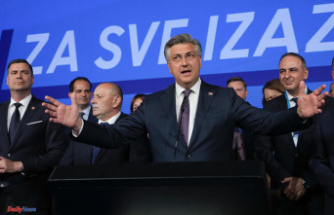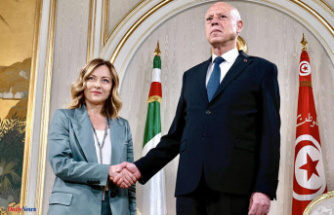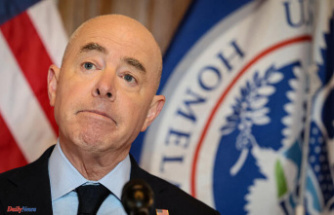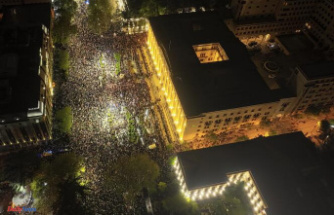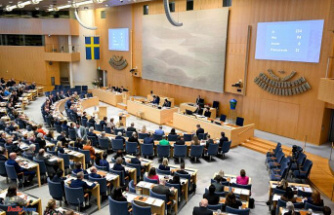Define Miguel de Unamuno is an arduous task. Liberal and a convinced pacifist, was opposed to the wars that lived in the Spain of the late NINETEENTH and early TWENTIETH centuries. So, until the arrival of the second Republic , which was received with open arms. However, and as stated by the spaniards and experts in their figure Colette y Jean-Claude Rabaté, soon desencantó with their successive governments and supported the uprising. The key is that, according to feature in their new work, "Miguel de Unamuno (1864-1936)" (Gutenberg Galaxy, 2019), he did so during a time tiny. Until you noticed the reality behind it.
Know of what they speak, as they have studied his life through an infinity of documents. Among them, an unpublished manuscript presented and that also rector outlined before his death. Why is this intellectual emerges then a certain whiff of opportunistic among the public? The conclusion we have reached is that the service of propaganda (and in particular José Millán-Astray , with whom he had a tense confrontation on October 12, 1936 in the auditorium of the University of Salamanca) knew how to exploit her figure.
1-does it Affect Unamuno the third Carlist War?
The third Carlist War had an imprint of the huge in her entire life. Until the end of the same, in 1936, spoke of it as a “civil war”; but a race that, for him, was very different to the one that began on the 18th of July. Unamuno came to romanticize this struggle, because it succeeded the liberals. And one of the guidelines of his life was the support to this current. At least, to the of that time. Be liberal in the NINETEENTH century meant to be against the absolute monarchy, and he always was. Like he was always in favour of freedom of thought.
2-did you Understand Unamuno the War in Cuba (and the loss of the colonies) as a moment bitter?
The War in Cuba gave him his status of intellectual (for us it was the most important in the first third of the TWENTIETH century). It was the first time that was expressed in favour of peace and against the form that had the empires to “civilize” other peoples. The opinion was contrary to that of the journalists and politicians, but he was committed to the task of an intellectual. What meant to be? To scrutinize the political life of the country; expressing his annoyance with reality if they so considered it, and try to convince others of your opinion. He tried it: throughout his life he received more than 20,000 letters and he used to answer the majority with sincerity. Example of this is that, in 1898, claimed in a that we worth losing Cuba.
3-Also suffered the death of 20,000 spaniards in the Disaster of Annual, and the Great War...
The War of Morocco was a trauma for him. His obsession was the Disaster of Annual. Never forgave her or the monarchy or the army. Protested against them in two weeklies clandestine: “Spain with honour” and “free Sheets”. Attacked them in a way violentísima. He said that they had done more for the black legend that all the rest of the world combined. Even wrote a poem dedicated to Abd el-Krim, which is not published. Shortly after, in the Great War, criticized the barbarism of germany and expanded his literary fame. Knowing languages could submit articles directly in French, for example. All that ended with the confinement of Unamuno Fuerteventura from February 1924.
4-is Believed Unamuno in the Republic?
-After his return from exile (in which he had received multitudinous in Irun, San Sebastian, Bilbao or Valladolid), proclaimed the second Republic in Salamanca from the balcony of the town Hall. He said he believed in the historical continuity from his theory of the intrahistory: he was a supporter of the events are like the waves of the sea, pass and go, but in the background is the true story of the peoples. In April of 1931 he believed that the society was going to be able to express themselves and to have the power again, but it was desencantando with the government by their measures. Never understood, for example, that removed the crucifixes from the schools.
5-what Was real, his enmity with Azaña?
-His enmity with Manuel Azaña was exploited and used as a weapon by the right. Not had a good relationship, but it is true that supported him a lot when he was fired, and that, at the end of their lives, were two figures that could be assembled. The Unamuno in front of the Civil War and the Azaña, in his speeches, calling for peace, mercy and forgiveness.
6-how Supported the military uprising?
-In the book we show that their support for the uprising was shy and short. He thought that the military would go. Believed that star in a pronouncement such as those of the NINETEENTH century and which, later, would allow the step to a republic. He had reason to think about it. The soldier who proclaimed the state of war in Salamanca ended with “long Live the Republic!”, the same thing that general Queipo de Llano. That's why he supported the coup, as demonstrated by the Franco re-instatement in the position of rector, which he had removed Azaña. But Unamuno was wrong, and, when he realized this, he confessed that he had been naive.
7-What did you do when you noticed this?
-Wrote two articles ("Examination of conscience" and "In the whirlwind") in which he asserted that one side was as cruel as the other. He explained that the "huns" (the republicans, by making a parallelism with the troops of Attila) were just as cruel to the "hotros" (the rebels). Although at the end he said that the "hotros" had become worse than the "huns". In one of his last drafts (unpublished and which we have discovered by us) made clear that the cause of the Civil War was the resentment, the hatred of the Spanish people against himself.
8-did you use the franco regime and the figure of miguel de Unamuno?
-Exact. There are several examples. He agreed to be a member of the city Council of a rebel, even though only one week; after that never again. But the propaganda used this in their favor. We took a picture posing next to the new mayor, who was in the military. The same thing happened with an alleged donation of 5,000 pesetas to the national side which was published in the press. It is unlikely that he would give such a huge amount, but yes that would help because the officers were obliged to do so. What is undeniable is that the same newspaper that gave that information said, after the death of Unamuno, who had been... get 15,000 pesetas! Yes signed (but did not write) a manifesto of the University of Salamanca, which condemned the barbaric red, but we coerced to do so. Millán-Astray, the chief of propaganda for Franco, exploited the image of Unamuno. We have also discovered that guarded the words of Unamuno.
9-How was the confrontation with Millán-Astray the 12 of October?
-We have found a report that clarifies the event, but we will know in a documentary of Manuel Menchón on Unamuno. What we can say is that the event was very similar to what we explained ten years ago in our first biography. The reality goes against the myth spread and created by Portillo, but his spirit is the same. He spoke of the anti-Spain, made reference to the criticism against the catalans and the basques... Could that propaganda may censor their speech, but we can not deny that there was a confrontation. It has been said that it was a bit of coffee, but Unamuno was struck by it. The Casino had banned him that same afternoon and the following day the town Hall. Was also dismissed... really, how nothing happened? It was the clash of the greatest intellectual in Europe in the first third of the TWENTIETH century with the founding of the Legion. The struggle of the ideology of the liberal humanist against the culture of the macabre and death.
10-What do you think of the new film of Alejandro Amenábar?
-even Though, for much that is said in some media, do not advise you to Alejandro Amenábar, we have already seen the movie and the actors bring so much. The result is good and interesting. But, as the director would say, is an interpretation, not a historical product. Take some licenses. As a counterpart, the project in which we work with Menchón seeks to be as rigorous as possible.
Date Of Update: 24 September 2019, 06:01

